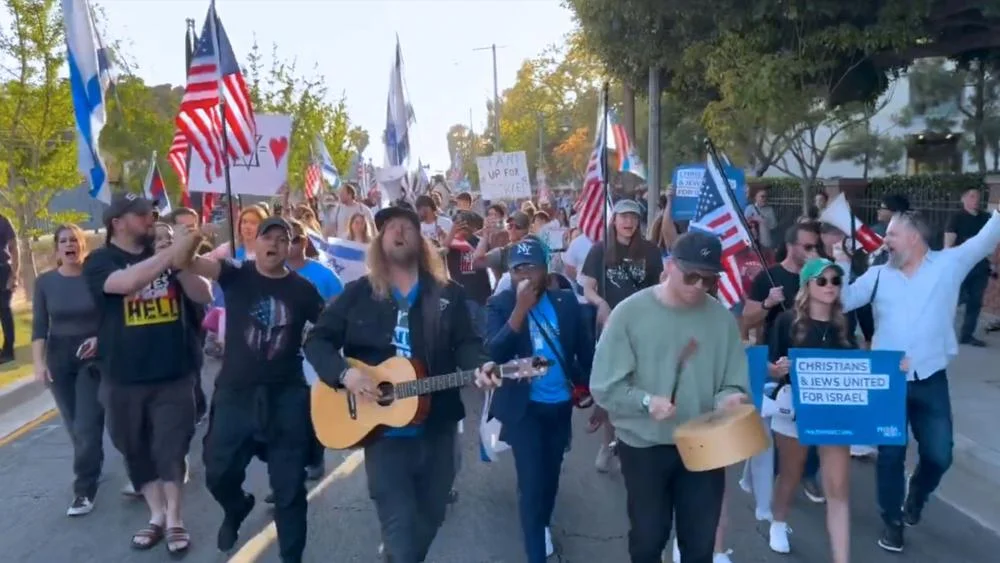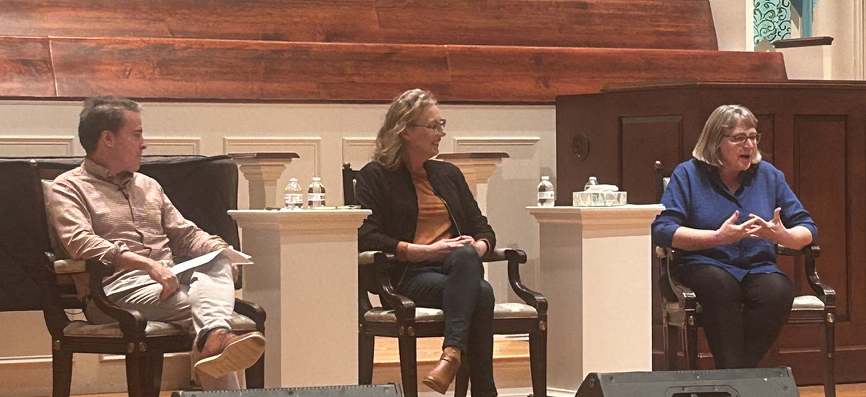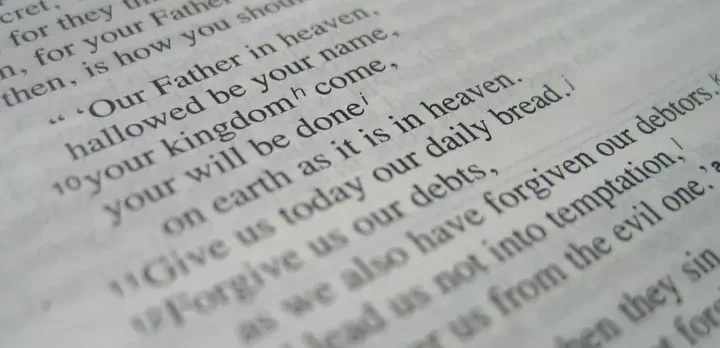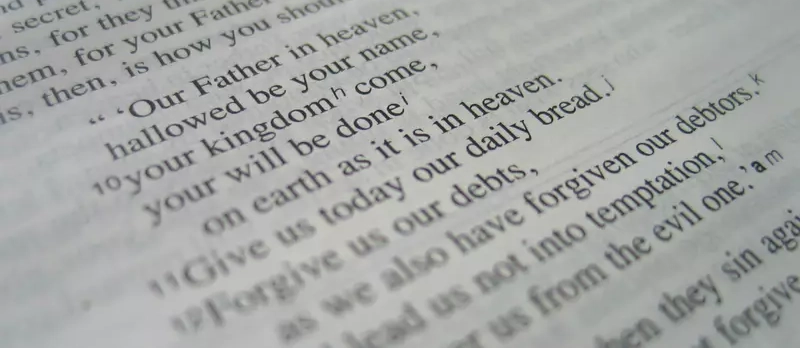Every election season since I left the final church I was a part of in 2019 is a reminder of why I don’t think I could ever go back.
And I know many ex-evangelicals agree with me.
I’m writing this just days before the 2024 election. So we don’t know what the exit polls will say about white evangelicals yet. But we all know it’s not going to be good. North of 80% will go for Donald Trump. And they’ll be voting in the millions.
Sociologist Ryan Burge said recently in a conference at Denver Seminary, “When a religious movement becomes overwhelmingly a political monoculture, that’s bad not just for the people in the pews, but for democracy as a whole.”

Rick Pidcock
While my concerns about the church include the political monoculture of support for Trump, they also include the theological monoculture of spiritual warfare paired with retributive justice that justifies support for Trump.
No matter how diverse theological communities may be from Bible-thumping men like John MacArthur to tongues-speaking charismatics like Paula White, virtually every evangelical church believes in spiritual warfare and retributive justice. So even if I were to attend a more politically muted evangelical church, they still would hold onto the same theological cards that are eventually played to hurt people.
“Virtually every evangelical church believes in spiritual warfare and retributive justice.”
They may hold their cards closer to their chest or smile prior to placing them down. But the theology and politics are still there, just waiting to be played.
This is why the problem goes much deeper than Trump. As Liz Cheney said to her fellow Republicans: “There will come a day when Donald Trump is gone. But your dishonor will remain.”
For example, the dehumanization transgender people feel from Trump’s $20 million anti-transgender ads will remain due to the dehumanizing mindset of the Christians those ads are tapping into. In an interview with CBC News, Chrissy Stroop explained: “It feels dehumanizing. And I mean that is the whole politics of it. It’s using a small population, marginalized population as a wedge issue by dehumanizing us.”
When I hear Burge conclude this monoculture mindset is bad for people in the pews and for democracy as a whole, I’m inferring that the evangelical monoculture is a harmful community for self and neighbor.
So why would I participate in that?
‘Stuck In the Middle with You’
In the season finale of BNG’s podcast, “Stuck In the Middle with You,” Benjamin Cole shares how he left the pastorate in 2008. “I knew I just couldn’t do it anymore,” he recalls. After moving to Washington, D.C., to work in far-right politics, Cole confesses, “I really almost lost my soul while I was in Washington. I journeyed far away from home.”
 Still, despite no longer attending a Baptist church at the time, Cole continued reading the Bible and occasionally attended mass at St. Matthew’s Cathedral.
Still, despite no longer attending a Baptist church at the time, Cole continued reading the Bible and occasionally attended mass at St. Matthew’s Cathedral.
Cole’s decision to leave the pastorate and my choice to leave the church likely were due to very different reasons. But much of the language Cole uses in this episode resonates with the feelings I was processing in making my decision.
When Paige Patterson called him once purportedly to apologize, Cole responded by saying: “I just want you to leave me alone. I want you to have nothing to do with me.” He then added, “I was so done. I walked away from it. And in the process of it, personally, I traveled a far distance from my own spiritual home. I got away from God for a long period of time.”
Then around 2014, Cole says, “Through a series of foolishness on my part and the providential hand of God, I was like, I have to be in church. … And I came back home. And I can just tell you, the Lord has restored the years which the locusts ate in my life.”
Cole now serves as a layman in a Southern Baptist church and seems to be enjoying that role. “I am hopeful that I can spend the next 20, 25 years of my life as a layman helping to reinvigorate Baptist laity,” he told BNG Executive Director Mark Wingfield.
Deconstruction vs. disengagement
Wingfield responds to Cole by making a distinction between deconstruction and disengagement. “So, the word of the decade in Christian life has been deconstruction,” Wingfield notes. “Everyone is in a flurry about deconstructing Christians, people who are rethinking their faith. And this word is very alarming to some people. It’s very comforting to others.”
“The political and theological monoculture of the evangelical church has become a tower of Babel that needs to be deconstructed.”
From my perspective, I love the term because it fits the “tower of Babel” analogy I so often refer to. In my assessment, the political and theological monoculture of the evangelical church has become a tower of Babel that needs to be deconstructed so those within its walls can breathe fresh air and meet their neighbors and the universe around them out from under the closed-in control and conspiracies of patriarchy.
“Most of the people I know who would say they’ve been through some form of deconstruction do not leave the faith. They reimagine the faith or they put aside the restrictive parts that are unnecessarily restrictive and they find a new way of grace through that,” Wingfield continues. “They give up the control and accept the freedom of it.”
Wingfield goes on to distinguish between the deconstructed who are still in dialogue with the church and the disengaged who have completely walked away.

Sean Feucht and followers in New York City. (Photo via Facebook)
Losing influence and ‘The Lord’s Prayer’
The articles I write for BNG often bring attention to wild stories about evangelicals who fear losing political influence to such a degree that they run to theology that harms their neighbors by sacralizing power and fueling retribution. The danger in writing stories like this is that it often gives the impression that people like Sean Feucht, John MacArthur, Josh Howerton, Doug Wilson, Steve Lawson and others are really far-out extremists.
These men are not exceptions to the rule.
Many evangelicals disagree with Christian nationalists’ view that we should coerce our neighbors into submitting to Jesus. And many evangelicals would denounce calls for violence against our neighbors.
But they believe in a heaven where Jesus will require everyone who didn’t bend the knee to evangelical theology on earth to be tortured for eternity.
One of the most common themes of the two weekends I spent with Sean Feucht this past month has been Feucht repeating the Lord’s Prayer: “Thy kingdom come. Thy will be done on earth as it is in heaven.”
“It depends on what the worshiper thinks God’s will is in heaven.”
At first glance, that may seem innocent enough. But it depends on what the worshiper thinks God’s will is in heaven. If God’s will in heaven is hierarchy and violence, then evangelicals praying for God’s will to be done here as it is in heaven are essentially asking God to bring hierarchy and violence to the United States.
This explains why in the days leading up to the 2024 election, many evangelicals are seemingly totally fine with Trump talking about Liz Cheney “standing there with nine barrels shooting at her.”
Maybe you’ve heard that he added, “Let’s see how she feels about it, you know, when the guns are trained on her face.”
It’s also why Trump appears to be suggesting that Joint Chiefs Chairman Mark Milley might deserve to be executed. And it’s why, earlier this year, Charlie Kirk suggested having Coca Cola-sponsored decapitations of Trump’s political opponents broadcast live for children to watch.
If God’s will in heaven is to put these people to a violent death, then God’s will being done on earth as it is in heaven would be a present embrace of hierarchy and violent death. So as we listen to their words in horror at the magnitude of their inhumanity, we’re getting a glimpse into what they imagine heaven to be like.
Based on the Lord’s Prayer, your theology of the afterlife directly influences what you pursue in this life. So when evangelicals promote the inerrancy of Scripture, while drawing inspiration from genocide in the Bible, and then claim to be “on the wall with a trumpet in one hand and a sword in the other to call the nation back to God,” the poison of power becomes inextricably intertwined within the narrative that brings evangelicals hope.
This is why Christa Brown wrote in Baptistland: “Perhaps it’s hard for many evangelicals to understand how something they hold so dear could possibly be so hurtful. But for me, everything connected to the faith of my childhood is a tomb of trauma. Prayer, Bible verses, hymns, God-talk, and the faith of my own heart were all perverted into weapons for sexual assault.”
Even something as seemingly innocent as The Lord’s Prayer is triggering to many of us. And as I’ve laid out in this piece, our trigger is not an emotional, knee-jerk overreaction, but comes from an understanding of how theology wields power over and harms us and those we love. And like Cole describing his leaving the pastorate in 2008, “I knew I just couldn’t do it anymore.”
Disengaging from and deconstructing the church’s foolishness
Wingfield is correct that there are many drifting away and finding what they consider to be better things to do with their Sunday mornings. But there’s also a spectrum.
For some, as Brown noted, disengaging the church may be an act of survival given how even the most innocent expressions of the faith feel like a “tomb of trauma.”
For others, deconstruction looks like engaging the church by working within its institutions to evolve doctrinal statements, liturgies, curriculum, programs and procedures.
And for some who have left, deconstruction looks like standing at a safe distance and naming the foolishness that needs to be dismantled, as well as opportunities for healing.
“Singing songs of retribution with a political monoculture of Trump supporters within the church almost cost me to lose my soul.”
Cole says he almost lost his soul when he left the church. Of course, I can’t speak for his experience. But I can notice how I resonate with his language, while sharing how I came to different decisions. And from my perspective, singing songs of retribution with a political monoculture of Trump supporters within the church almost cost me to lose my soul.
Cole says by leaving the church he journeyed far from home. But from my perspective, my journey was becoming aware of my home in the relationship of self and neighbor, and then learning how the church was creating theologies and systems that exiled me from that home.
Cole says he got away from God. But from my perspective, the presence of God is in and among us, and the whole universe lives and moves and has its being in God. So leaving institutions that were exiling me from living in harmony with that reality was not getting away from God, but was living more in tangible communion with God.
Cole says by returning to the church, God restored the years the locusts had taken. But from my perspective, restoration is happening outside the church walls as I engage the church and those its harmed through the healing of lament, anger, joy and curiosity.
So while Cole’s experience is that his foolishness led him back into the church, my perspective is that the foolishness of the evangelical church led me out.

Robert P. Jones, Kristin Du Mez and Diana Butler Bass at First Baptist Church of Greensboro, N.C.
A surprising experience at First Baptist Greensboro
Over the past two elections since leaving, all of the hierarchy and retribution fueled foolishness of the evangelical church bubbles to the surface for me and I can’t possibly imagine going back. And as Liz Cheney pointed out, it’s not going to change when Trump goes away.
My engaging with the church since 2020 has primarily come through my writing for BNG. And this past month, that journey led me to multiple worship events across North Carolina and Washington D.C.
In my article about my experience at the “Kingdom to the Capitol” tour and the “Faith and Democracy” tour, I share a series of contrasts that were unlike anything I’d ever seen in a single day.
But one contrast I didn’t mention was simply the contrast of setting. Sean Feucht’s worship tour happened outside the church walls, while the event put on by Diana Butler Bass, Kristin Du Mez and Robert P. Jones happened within the church walls.
One might suspect that this former T-shirt and jeans wearing worship leader who left the church may have felt more at home outside with the multi-racial, multi-cultural gathering of worshipers. But despite everything I’ve written in this piece, I felt more at home within the walls of First Baptist Church of Greensboro in a gathering made up overwhelmingly of nicely dressed white people.
Why?
“For two hours on an October evening in a Baptist church, I was able to feel what it was like to breath out my questions and name some things to Jesus in church.”
Because at First Baptist Church of Greensboro, the white people weren’t shouting demands but were quietly listening, learning and lamenting the harm white supremacist religious communities have caused. It was a very healing experience to witness them listening without defensiveness.
Many of us who have left our churches never have experienced a space within the church walls to ask our questions and share our observations without theological drywall being put up in our face.
So this Tuesday evening when the exit polls start coming in and I feel my anger toward evangelicals rise, I’m going to be fully justified in feeling that. And I’m not going to be able to imagine ever going back and joining a church again. But I’m also going to remember that for two hours on an October evening in a Baptist church, I was able to feel what it was like to breathe out my questions and name some things to Jesus in church.
Whether we choose to stay within the church walls or work outside them following this election season, we need to foster more communities of white people listening to marginalized people in order to counter the millions of dollars of political ads being targeted to white Christians against them.
As R. Scott Okamoto, author of Asian American Apostate, wrote this week, “Because whiteness is seen as better than all other identities and systems of power are erected to maintain this superiority, we all need to reset our brains to see each other and see ourselves as equally valuable. This is the only way to achieve true mutuality. Honestly, I don’t think we’ll ever get there. Not in my lifetime, for sure. But the fight for it has become our life’s work, especially in the deconstruction world.”
Rick Pidcock is a 2004 graduate of Bob Jones University, with a bachelor of arts degree in Bible. He’s a freelance writer based in South Carolina and a former Clemons Fellow with BNG. He completed a master of arts degree in worship from Northern Seminary. He is a stay-at-home father of five children and produces music under the artist name Provoke Wonder. Follow his blog at www.rickpidcock.com.
Related articles:
Of worship warfare, theocracy and a weekend with Sean Feucht | Analysis by Rick Pidcock
A tale of two rallies on the same day in North Carolina | Analysis by Rick Pidcock


